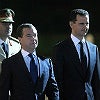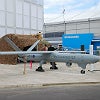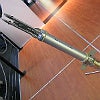
Suicide bomb blast kills four senior Syrian officials

July’s headlines were dominated by the escalation of violence within Syria, particularly following a suicide bomb attack which killed four members of President Bashar al-Assad’s inner circle.
The attack claimed the lives of defence minister general Daoud Rajiha, assistant vice president Hassan Turkmani, interior minister Mohammad Shaar and al-Assad’s brother-in-law Assef Shawkat.
The blast, thought to have been carried out by a bodyguard working of Assad’s inner circle, came as the Free Syria Army launched a series of attacks against the nation’s capital of Damascus, dubbed Operation Volcano.
The attack cast further doubt over the sustainability of Assad’s regime, sparking many Western leaders to urge China and Russia to sanction a UN security council resolution.
US likely to cancel Mi-17 contract with Russia

International condemnation of violence within Syria also impacted defence acquisition contracts after the US announced it was likely to cancel its contract with Russian state-arms exporter Rosoboronexport to acquire Mi-17 utility helicopters after US Congress voted against it.
The vote was taken in response to increasing concerns within the US Government that Russia was arming al-Assad’s regime with attack helicopters and fighter jets.
These fears were seemingly confirmed when a Syria-bound vessel carrying attack helicopters was stopped off the coast of Scotland after having its insurance revoked.
Democrat congressman Jim Moran condemned the violence within Syria, adding: “Furthering contracts with Rosoboronexport contradicts our nation’s commitment to the principles of freedom and democracy.”
France and UK boost military drone cooperation

A key collaboration agreement between the French and UK defence ministers was signed in July, confirming increasing cooperation in the development of military drones. UK defence secretary Philip Hammond and his French counterpart Jean-Yves Le Drian signed two memoranda of understanding.
The first will see France acquire a Thales-built Watchkeeper WK450 UAS with a view to purchasing more in the future, while the second agreement confirms the initiation of a programme tasked with the development of a future combat air system for deployment between 2030-2040.
Worth approximately €12m, funding will be split between France’s Dassault Aviation and the UK’s BAE Systems, with any resulting vehicle likely to borrow from the former’s nEUROn programme and the latter’s Taranis aircraft.
UK MoD to deploy additional troops for Olympics

The start of the 2012 London Olympic Games on 27 July 2012 was an influential story, however it risked being overshadowed by a growing row about security measures and the failure of commercial security provider G4S to ensure a sufficient number of trained personnel were readily available for the Games.
This led to UK defence secretary Philip Hammond confirming the deployment of an additional 3,500 troops to help secure London for the duration of the event, bringing the total number of MoD personnel deployed from all three services to 17,000.
G4S was forced to accept responsibility for any increased military deployment for their shortfall and faced damning criticism for failing to alert authorities of a potential shortfall sooner.
British Government confirms GBAD deployment for Olympics

Concerns were also raised regarding the deployment of ground-based air defence systems to prevent airborne terrorist attacks, with local residents opposed to the location of some installations.
Rapier and Starstreak high velocity missile systems were installed at six sites around London, with residents opposing the contentious decision to locate some missile systems atop the Lexington Building in Tower Hamlets and the Fred Wigg Tower in Waltham Forest.
A late legal challenge failed to prevent the systems from being deployed.
Hammond to unveil Future Force 2020 cuts
The UK was also given a vision of what its armed forced may look like in 2020, as defence secretary Philip Hammond unveiled details surrounding further cuts to the nation’s armed forces.
In what was dubbed as the largest reorganisation of the armed forces in more than a century, the number of soldiers within UK army ranks will fall from 102,000 to 82,000.
Commenting on the cuts, a Ministry of Defence spokesman said: “These are necessary changes due to touch decisions, which had to be made.”



